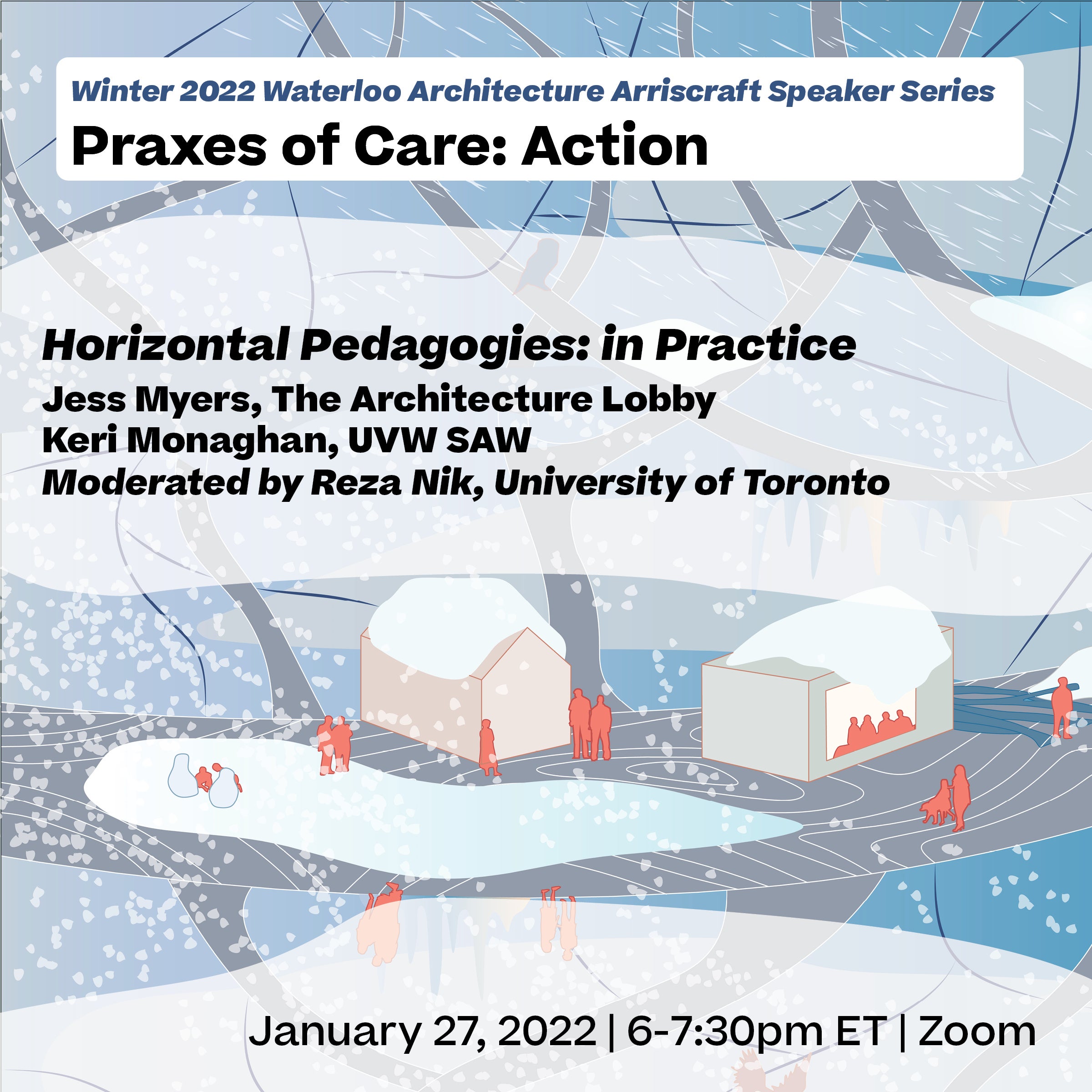
In Honour of Andrew Levitt, celebrating the legacy of a Professor Emeritus dedicated to teaching on care, and with care.
Please join us for Horizontal pedagogies: in practice, the first of five conversations on the theme of action, with speakers Jess Myers, The Architecture Lobby, and Keri Monaghan, UVW SAW. Their short presentations will be followed by a discussion moderated by Reza Nik, University of Toronto.
Praxes of Care asks, “what is an architecture of care?” Over four terms–Fall 2021 to Winter 2023–a series of conversations will bring together two or more architects, designers, researchers, artists, activists, and care workers to discuss care processes according to the themes of Attention, Action, Communication, and Maintenance. The series is curated by faculty, staff, and representatives of student groups: Treaty Lands Global Stories, Bridge, and the Sustainability Collective. Recent calls for change have shifted the discipline toward the underlying social and ecological processes enabled by the production of architecture. By listening to and learning about care practices from interdisciplinary perspectives, we can begin to reshape the discipline of architecture into a form of care.
WINTER 2022: ACTION
In our ongoing Speaker Series, this semester we investigate action within a praxis of care.
In taking action within care practice, we first take on responsibility. To act in care also requires additional factors that care theorists Joan Tronto and Bernice Fisher identify as time, material resources, knowledge, and skill. We might also add emotional and physical energy to this list. As a praxis, care is the manifestation of theory through embodied practice. We, as architects, are in a powerful position to care for and with people through our practices of placemaking. Architects and designers have an explicit obligation to their publics to take on the responsibility and enactment of care work.
In the action of care, the carer often has power over the cared-for. Care work, therefore, lives within power imbalance. Western technoscience theorists Aryn Martin, Natasha Myers, and Ana Viseu reflect on how critical care practices must be “committed to an intersectional feminism that can grapple with the constellations of power manifest in concatenations of capitalism, colonialism, race, class, ability and gender.” As architects working within a position of power, we must practice care-fully.
SPEAKER BIOS
Jess Myers is an urbanist, podcaster, and editor focusing on urban planning and architecture. Jess is the series editor of Taking Freedom, a social justice book series, which will be published by a coalition of the Service Employees International Union and MIT’s Community Innovators Lab. She was formerly the co-steward of the Architecture Lobby’s New York chapter, a member driven architecture group that seeks to improve labor conditions in the field. Her podcast, Here There Be Dragons, explores the intersection of security and identity politics in urban space.
Keri Monaghan is an elected Workplace Organizer at United Voices of the World - Section of Architectural Workers (UVW?SAW). Last year she supported members in their workplaces to walk out over coronavirus health and safety concerns and win support for working from home, and is currently supporting workers around issues like unpaid overtime and bullying. United Voices of the World – Section of Architectural Workers (UVW-SAW), is a member-led trade union for architectural workers in the U.K, formed in 2019 after an 18-month Workers’ Inquiry. Members of SAW collectively organize both in their workplaces around overwork, underpay, unstable employment, toxic workplace and university culture, discrimination and unethical practice. They use models of worker-to-worker solidarity to hold bosses accountable.UVW-SAW includes: architectural assistants, model-makers, BIM technicians, admin workers, architects, landscape architects, students, visualizers, researchers, receptionists, university workers, interior designers, freelancers, sole traders; from all sizes of practice, and across the U.K.
Reza Nik is an architect, artist and educator based in Toronto, Canada. He is the founding director of SHEEEP - an experimental architecture studio working at the intersection of community & culture. Reza is also an Assistant Professor in the Teaching Stream at the University of Toronto's Daniels Faculty of Architecture, Landscape and Design. He is also one of the co-founders of the Toronto chapter of the Architecture Lobby.
Accessibility: Waterloo Architecture is committed to achieving accessibility for persons with disabilities who are attending the event. Closed Captioning will be available during the live event. For accommodation questions and requests, please contact us in advance of the event at adudnik@uwaterloo.ca.
For more information on this series and other events presented by Waterloo Architecture, please visit waconnect.ca or follow us @waterloo_architecture.
If you enjoy this lecture series and would like to help the School of Architecture continue to provide similar education activities and engagement opportunities, please visit our support page. Thank you for your dedication to our students and to our School!